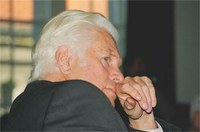This is a news release from INTERVOICE about a day for celebrating humane alternatives for people who hear distressing voices.
Press Release from:
INTERVOICE International Network for Training Education and Research into Hearing Voices
For immediate Release: Press Release:
Celebrate World Hearing Voices Day and 20 years of achievement, 14th September 2007
Today, INTERVOICE www.intervoiceonline.org, the International Network for training, education and research into Hearing Voices, holds the second World Hearing Voices Day.
2007 marks the 20th year of achievement since the hearing voices movement took its first step, when in 1987, Dutch voice hearer Patsy Hage challenged Marius Romme, her psychiatrist, with her criticism of his clinical approach to her voices. She pointed out that rather than using voices only in order to make an illness diagnosis it would be more useful if he helped her learn to cope with the experience. He listened, acted and the rest is history. From this beginning INTERVOICE, has grown into an international network with 14 participating countries.
As Marius Romme, the President of INTERVOICE recalls:
In 1987, I had no idea the impact that the discovery that accepting and making sense of voices was a helpful alternative was going to have. Yet, after twenty years of work we have built a unique and formidable movement of voice hearers and allies that has brought about a big change in the way hearing voices are regarded and has found new ways of helping people overwhelmed by their voices.”
The international awareness day intends to combat the secrecy and stigma surrounding hearing voices. The aim is to celebrate voice hearing as part of the diversity of human experience and raise awareness of the fact that hearing voices, in and of itself, is not a sign of mental illness — indeed many people hear voices, such as painters, author’s, spiritual mediums and others are sought after, for their voice hearing capabilities.
Each year Hearing Voices Networks and Groups worldwide mark the occasion with an activity or event to:
- Raise awareness of the phenomenon of hearing voices
- Challenge negative attitudes towards people who hear voices
- Challenge incorrect assumptions about voice hearing as a sign of an illness,
- Raise awareness of the issues of stigma and discrimination faced by people diagnosed with a mental illness, and
- Give voice to the call for dignity, liberty and self determination
The centrepiece of this years celebration is a conference being held in London, hosted by Together, an organisation based in the UK that works with people who have mental distress, to help them get what they want from life – and feel happier. This conference aims to bring together experts with experience of hearing voices and professionals to share their understanding of voice-hearing and to explore exciting new non-medical ways to work with voices.
Launching World Hearing Voice Day.
Professor Marius Romme said:
“Typically, in Western medical thinking hearing voices has always beenassociated with mental illness and frequently seen as a symptom ofschizophrenia. Yet, we discovered many people who hear voices do nothave a mental illness and never seek help. For this reason we areprepared to accept a range of explanations offered by people who hearvoices, including spiritual ones, and believe it is essential to theprocess of recovery from overwhelming voices to understand the meaningof the voices to the voice hearer. “
He added
“Whilst we are finding more holisitic solutions to voices that cause mental distress then those offered by psychiatry. It is very important to stress that in our view voices are an aspect of human differentness, rather than a mental health problem. As with homosexuality, which was also regarded by psychiatry in recent times as an illness, the main issue we have to confront is the denial of the human rights to people who hear voices and our main task is to change the way society perceives the experience. Only if can we do this, do we believe psychiatry will change its mind about voices. That is why holding a World Hearing Voices Day is so important”
END
Document Actions


